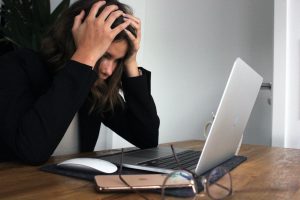Depression
The Nuance of Positive Thought
 As many of you know, I suffer from congenital gout disease, inherited from my father, surely exacerbated by growing up on an American diet, in addition to my own part of culpability in adolescent self-destruction. Thankfully, it is under control with an Eastern diet and medicine, a victory I take great pride in.
As many of you know, I suffer from congenital gout disease, inherited from my father, surely exacerbated by growing up on an American diet, in addition to my own part of culpability in adolescent self-destruction. Thankfully, it is under control with an Eastern diet and medicine, a victory I take great pride in.
Between the winter holidays I am as guilty as many of pushing the over-indulgence envelope (relative to my own standards), and one night last week, as our toddler was giving us a hell of an evening in resistance to sleep, I experienced some pain in the distal inter-phalangeal joint of my big right toe (always the culprit, interestingly located on acupuncture’s meridian that corresponds with the pancreas!). It was the perfect storm of parenthood physiology: The body needs twice as much rest and self-care, and is allotted half (if you’re lucky). Needless to say, I was worried, as we all are when our Achilles heels rear their heads, that this would “turn into something.”
Because of said toddler insubordination, the subversive from within, plus an early workday the next morning, my wife and I had already conceded a good night’s sleep. Instead, just to unwind, we put on our latest favorite show, I soaked my feet in hot epsom salt water for 20 minutes, during which I needled points on my left hand to treat my right foot (a particular style and technique many of you have suffered through at my hands, no pun intended).
The next morning I woke up tired, only moments before my daughter did, insisting, requesting, yelling, and crying, offering me no moment of reprieve or transition into consciousness (it truly never ends) as I got everything ready for the day. I was tired. My head had that subtle pounding to it that heads have after going down too close to midnight and/or waking too early. I felt irritable and frustrated. BUT… my toe was pain-free!
When we are exhausted or irritable about something or someone, it can be challenging to focus on the positive—look at the bright side instead of the hole in the donut. I spent the day reminding myself, each time I got annoyed or felt resentful, of my right foot, my big toe, how much worse that could have gone, what it could have meant for the week to come, and how big of a disaster I avoided. Not to mention that my daughter did have pre-school the next day and the weather was nice! There have been instances in the past where my joint pain worsened, school was out, I was on full-time Dad-duty, and the weather was awful. All considered, I was very lucky. Sure, I was tired and the day wouldn’t feel or probably go as I’d planned or hoped, but I repeatedly made an effort to return my focus to that toe, and all the things that had gone right.
Patient sometimes come in and apologize for telling me everything that’s still wrong when overall they’re doing much better and so many things are positive, and I remind them that my office is the place to focus on the negative. Apprise me of every imperfection as it aids in the diagnostic process in our aim for physiological optimization. In the remaining 23 hours of every day though, try to focus on that healed part of you that was previously headed in a drastically different direction. I understand it’s not always that easy—the negative is not always as simple or temporary as a bad night’s sleep, a mild headache, or argument. For such instances I extend my sympathy and support.
When is Stress Actually to Blame?
 I feel like in the 20th century no one was talking about stress as an etiology for disease. Possibly I am guilty of generational egocentricity, having barely reached the drinking age by 2000. Thankfully, I had very few young friends discussing ailments and how they came about.
I feel like in the 20th century no one was talking about stress as an etiology for disease. Possibly I am guilty of generational egocentricity, having barely reached the drinking age by 2000. Thankfully, I had very few young friends discussing ailments and how they came about.
Still, I think it is more referenced, even over-diagnosed nowadays, especially by western doctors any time they cannot explain a symptom or its etiology, shrugging shoulders and throwing their arms up, citing the most probable suspect. “Might just be stress,” they say, which for its listener might feel an implication that their complaint is a fabrication of the mind, if not something that can only be resolved or improved once everything in life is good, or they achieve spiritual enlightenment, neither of which are in the cards for most of us this go around.
While I’m all for patients having agency over their own health, things happen that are out of our control—an accident, post-viral symptoms, genetic predispositions, or just life—when it helps to have a knowledgeable clinician to provide valuable insight and hopefully effective treatment.
In Chinese Medicine stress is said to have a drying effect on the body. This is why when people “stress eat” they crave “damp-causing foods,” such as cheese, bread, and sugar.
Unfortunately, such foods do not generate healthy fluids, nor is stress-induced dryness the kind that will drain pathogenic dampness. Instead, the drying effect of stress refers to the depletion of mucosal organ fluids, beneficial stomach fluids (anyone get acid reflux or diarrhea when over-stressed?), and/or those that lubricate our orifices, gyri and sulci of the brain. Although hydration is advisable, drinking water cannot replace these fluids.
In early stages or mild cases, the best way I know to restore such fluids is through rest, sleep, and the consumption of eggs, bone broths, or red meats. For the rest of us herbal medicine is necessary. Herbs such as ginseng or licorice for the gut, puerariae root for the head and neck, ophiopogonis for the intestines, atractylodes for the intestines, trichosanthis for the orifices, or rehmanniae for the brain and blood. Always consult a (real) herbalist before taking.
Although extensive periods of stress are never helpful, it is important clinically, to thoughtfully discern between when stress is, and when it is not the primary cause of a particular symptom. Almost everyone in modern society has at least moderate degrees of stress, yet everyone is walking around in enormously different stages of health or discomfort.
From our perspective, when stress directly brings up a symptom, it informs us that dryness is probably at its root of imbalance. The body couldn’t tolerate any further depletion of fluids. Then, and only then, is when stress is to blame—not to mention the fact that most disease is multi-factorial. Systemic dryness is likely only part of the picture, which is why many people “do all the right things”—exercise, meditation, good sleep hygiene—but still experience symptoms. Because it is almost never “just stress.”
Can It Be All Stress?
 “It’s just stress,” is a diagnostic platitude commonly heard by patients when relaying either to friends or their doctor about some odd or non-immediately fatal symptom that lacks any conventional, empirical treatment.
“It’s just stress,” is a diagnostic platitude commonly heard by patients when relaying either to friends or their doctor about some odd or non-immediately fatal symptom that lacks any conventional, empirical treatment.
It would be an over-simplification to label this stock response as wholly or always dismissive—in my opinion it is more often a result of the listeners’ lack of knowledge of physiological nuances, disease spectrums, and of course the entire internal paradigm of Chinese Medicine.
The mind is en vogue in the past generation, so much so that people jump at the opportunity to sound mentally acute even while being mentally lazy in its default citation as a scapegoat for everything, the way fat was in the 20th century or sugar is now. It makes them feel aware of the more mysterious, all while maintaining an orthodox adherence to conventional medicine’s present understanding of things. I picture people picturing themselves as if sipping a small cup of whiskey wearing Coke bottle glasses and a bowtie in their reply: “It’s (probably just stress),” then putting their cup back down and nodding their head as if they’d just cured HIV.
While no one could dispute that stress is an important variable in the etiology of most illnesses, it is also just that: One important variable. So why when we have curious symptoms that conventional medicine has no explanation or treatment for do they never say: “It’s just diet?” “It’s just your sleep hygiene?” Or: “It’s just your exercise routine that needs refinement or reduction, or simply needs to exist?”
Why when one person experiences incredible stress does it show up as digestive issues, while for another it does as insomnia, and another as hives all over their skin? “People are different,” idiots might shrug and say, which isn’t untrue, but is an egregious oversimplification. People are different, which means if we each consumed diets and partook in exercises suitable to our own individual constitutions, we’d likely be able to ward off the ill effects of short or even medium-term life stressors.
If stress causes you low back or neck pain we know there is “dampness trapped on the exterior layer of the body.” If stress causes stomach issues we know there are already stomach issues, since most or many people can endure stress without such symptoms. If stress causes headaches or migraines then there was likely already some dysregulation of cerebrovascular flow in particular neurological pathways
In this way stress can be invaluably informative, by tipping our internal scale and showing us where we are weak, where in our bodies we are retaining pathogenic fluids, so we can properly treat, instead of dismissing it. Because odd, inexplicable symptoms are never nothing. They are not “all in our minds” or insignificant. Instead, from a Chinese Medical perspective, sadly they are potential coming attractions—foreshadows of diagnoses to come.
I apologize if this sounds dark or ominous. My intention is the opposite, to offer optimism and agency to those of us who have been repeatedly implied to that we must resolve all of our internal turmoil in order to be free of a particular problem. While I am all for a daily practice of meditation, prayer, community, and anything else that reduces stress, we should be able to also rely on medical providers to step in with something more to offer during periods where our practice of psycho-emotional work and discipline just is not enough.
Can Acupuncture Help with Depression?

As mental health issues have come to the forefront in recent years, many have sought more natural treatment options that don’t involve pharmaceuticals and their potentially harmful effects. Acupuncture has become a popular option for treating mental health issues, including depression. But does it work? Before we answer that question, let’s give a proper definition to both acupuncture and depression. continue reading


